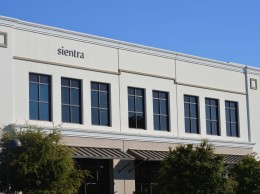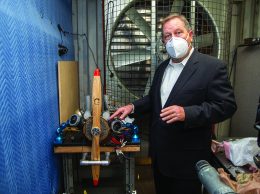Sientra implants could be back on the market in weeks
Sientra made three major announcements on Jan. 7: It is not yet resuming production at its factory in Rio de Janeiro, it is looking for a new manufacturer of its implants and the existing inventory could be back on the market within weeks.
On Jan. 8, the British Medicines and Healthcare Products Regulatory Agency also gave an update and said Sientra’s current manufacturer, Silimed, had its European quality management certificate, known as a CE-mark, suspended until June.
The announcement by the Medicines and Healthcare Products Regulatory Agency explains why Sientra is not resuming manufacturing yet. Sientra CEO Jeffrey Nugent made the announcement in a letter to plastic surgeons at about 5 p.m. on Jan. 7. For days, investors and plastic surgeons have been excited, saying they thought the Goleta based breast implant manufacturer would resume production or start selling its remaining inventory any day.
Sientra stock was up five days in a row from Dec. 30 to Jan. 5. The stock acted like investors knew an announcement of some kind about manufacturing or product sales was imminent. On Jan. 5, it even hit a peak of $7.09 before closing at $6.73.
A Sientra spokesman told the Business Times on Jan. 5 an announcement of some kind would come before Jan. 8.
Sientra traded down on Jan. 6 to $6.62 and closed Jan. 7 at $5.90 per share.
Bill Baum in an investment manager at Great American Investors in Kansas City, Kan. and a Sientra investor who bought stock on Nov. 18. He was excited on Jan. 5 about the possibility of Sientra selling its products and resuming production again.
“We hit a high today of $7.09, so there’s clearly some good, solid buying,” said Baum said. “But right now your run rate is just about five times normal volume, so, clearly — who knows.”
While Baum was excited at the time, his optimism was guarded. He still had questions about how manufacturing might resume because of a fire that burned down the biggest building at the factory of Silimed on Oct. 22. Sientra officials said several times since that manufacturing at a smaller Silimed plant is possible, but would require significant renovations.
In the letter to plastic surgeons, Nugent said Sientra finished an internal review of the safety of its products. The company then sent data from those tests to the FDA by the end of 2015 as planned.
“Over the last few months, we’ve been making important progress,” Nugent said in the letter. This is an important component of our return-to-market strategy, and we look forward to providing you with further updates as we move forward. In our view, the data has concluded that all Sientra products are safe and represent no significant risk to your patients.”
Nugent also hinted Sientra implants might return to the market in just a few weeks.
Nugent may have hinted at when Sientra products will return to the market. Near the end of the letter, he gave a vague timeline of when Sientra will re-enter the market for the first time.
“I look forward to communicating with you further in the coming weeks and on a continuing basis as we re-enter the market,” Nugent said. “We are also continuing to aggressively develop a variety of alternatives for a high quality, stable manufacturing solution.”
Nugent may make a handsome profit off the announcement. He exercised a stock option on Jan. 1 to buy 241,753 shares at the Dec. 31 closing price of $5.92 per share. That increased Nugent’s stake in the company to 879,811 shares.
German inspection agency TUV SUD found implants contaminated by microscopic particles of silica and cotton during April and July inspections of Silimed’s factory. Silimed’s CE-mark was suspended on Sept. 17 and Silimed sales were suspended in Europe on Sept. 23. Sientra products were voluntarily pulled from U.S. shelves on Oct. 9.
Sientra has maintained its products are safe ever since. While Sientra is working with the FDA to bring its breast implants back to market, the FDA has not taken any regulatory action and has not initiated its own review.
During a conference call with investors on Oct. 30, Sientra said it had about a year’s supply of implants already produced and waiting to be sold. At the time, Sientra also had cash reserves of about $148.9 million.
Silimed’s CE-mark suspension expired on Dec. 17, raising the possibility the company could re-start manufacturing Sientra implants. A spokesman for the MHRA said at the time the CE-mark suspension would be continued because of the Silimed factory fire.
In a statement issued on the morning of Jan. 8, the Medicines and Healthcare Products Regulatory Agency said European Union officials are still conducting tests to see if the 20 nanometer in diameter particles pose any health risks to patients. In the meantime, it reiterated its previous position that there is no risk to patient safety.
“The CE suspension by TUV SUD has been prolonged until the end of June 2016 due to the exceptional circumstances and occurrences in particular the fire in the main manufacturing site,” the agency said in a statement.
Sientra’s stock spiked in early-morning trading in reaction to both the announcements. In pre-market trading the morning of Jan. 8. Sientra’s stock hit $7 per share at 5 a.m. At 5:30 a.m. it peaked at $8.85 per share. By the time markets opened at 6:30 a.m., the stock settled to $7.58 per share.
• Contact Philip Joens at [email protected].










